The Implosion of Kazakhstan was Unexpected[Over]  By Benyamin Poghosyan, PhD, Chairman, Center for Political and Economic Strategic Studies By Benyamin Poghosyan, PhD, Chairman, Center for Political and Economic Strategic Studies
We need time to understand better what happened in Kazakhstan, and why". Whilst sending CSTO troops to Kazakhstan was clearly President Putin's decision to support President Tokayev in the internal fight between Kazakh local elites, the deployment has implications also for other countries participating in the mission, including Armenia.
The beginning of 2022 surprised many. While experts and pundits were busy discussing the possible outcome of the Russia – US and Russia - NATO negotiations, scheduled for early January, and seeking to predict if large-scale hostilities would break out in Ukraine, Kazakhstan imploded. This vast country with less than 20 million population, with huge reserves of oil, uranium, and other minerals and a significant geographical location connecting China with Russia and Europe, seemed to be an island of stability in the vast landmass of Eurasia. President Nursultan Nazarbayev had ruled the country since its independence, and while he stepped down in 2019, he maintained his influence and control from the position of Chairman of the Security Council. The second President of Kazakhstan, Kassym - Jomart Tokayev, a professional diplomat who started his career in the Soviet Union, seemed to be an excellent choice for Nazarbayev, enabling him to organize a smooth power transition, keep the stability of the country, and his primordial leading position. READ MORE
"Summit of Democracy" Puts Smaller States in a Complicated Situation[Over]  By Benyamin Poghosyan, PhD, Chairman, Center for Political and Economic Strategic Studies By Benyamin Poghosyan, PhD, Chairman, Center for Political and Economic Strategic Studies
Regardless of the intentions of the US and the future trajectory of the new world order transformation, the democracy vs. authoritarianism vision puts small states located between Russia and Europe in a complicated situation.
As the "Unipolar Moment" started to fade away after the 2008 world financial crisis, political elites, the expert community, and academicians in the different capitals of the world launched discussions and debates about the future of the world order. There was no lack of catchy terms – post-American world, multi-polar world, no polar world, polycentric world, the rise of others – which all have one common feature; there will be many players active on the geopolitical chessboard of the globe, and the US will not be able to impose its vision on all of them. The US political establishment coined its term for the emerging world order – great power competition – which is the prevailing theme in all strategic level documents published by the Trump and Biden administrations. READ MORE
- December 18, 2021 17:39PM
Is Iran making a comeback to the South Caucasus?[Over]  By Yeghia TASHJIAN, Beirut-based regional analyst and researcher, columnist, "The Armenian Weekly” By Yeghia TASHJIAN, Beirut-based regional analyst and researcher, columnist, "The Armenian Weekly”
Since the collapse of the Soviet Union 30 years ago, Iran has patiently and cautiously followed developments in the South Caucasus. Tehran’s main strategic objective has been to prevent US-Israeli penetration in the region, and it has viewed the Russian political and military presence in the region, particularly in Armenia, as a buffer zone against Western and even Turkish expansionist activities. When Turkey started to follow an independent foreign policy and came to terms with sharing power in the region with Russia, Iranian policymakers thought that Turkey—by cooperating with Russia—would reduce western influence in the region and give up its Pan-Turkic and neo-Ottoman claims. However, Iran was mistaken. READ MORE
- November 24, 2021 21:20PM
The debate about the “Corridors War” is not based on reality[Over]  By Benyamin Poghosyan, PhD, Chairman, Center for Political and Economic Strategic Studies By Benyamin Poghosyan, PhD, Chairman, Center for Political and Economic Strategic Studies
The "corridors war", currently being hotly debated among experts, pundits, and policy-making circles in the South Caucasus, is largely based on wishful thinking rather than hard facts. In reality the options are rather limited.
Since the end of the 2020 Karabakh war, the theme of competing corridors in the South Caucasus has established itself as one of the primary topics for discussion and debate among experts, pundits, and policymaking circles. Almost daily, Azerbaijan and Turkey speak about the necessity to open the so-called "Zangezur corridor," arguing that it will significantly boost the regional economy. According to Baku and Ankara, the opening of the corridor is envisaged under the terms of the November 10, 2020, trilateral statement, even though the document itself speaks about only one corridor – Lachin. Under the term “corridor”, Azerbaijan envisages an arrangement which will allow Azerbaijani vehicles and trains to cross the Armenia – Azerbaijan border, pass via the Syunik province of Armenia and then enter the Nakhijevan Autonomous Republic (an Azerbaijani exclave), without any border, passport, and customs control implemented by the Armenian side. READ MORE
- November 16, 2021 12:54PM
Georgia’s Mediation Moment[Over]  By Benyamin POGHOSYAN, PhD, Chairman, Center for Political and Economic Strategic Studies By Benyamin POGHOSYAN, PhD, Chairman, Center for Political and Economic Strategic Studies
Whilst Georgia has long acted as an informal home for peace building initiatives between Armenia and Azerbaijan, its recent offer of its “good offices” shows a higher level of engagement.
Ever since the end of the first Karabakh war, Georgia has become a Mecca for meetings of Armenian and Azerbaijani experts, peacebuilders, and other civil society representatives. Buzz words such as Track 2 and Track 1.5 diplomacy in the context of the Karabakh conflict settlement process could be heard very often in hotel conference halls and board rooms in Tbilisi, Bakuriani, Telavi, and other places. Given the apparent obstacles in bringing Azerbaijani experts to Armenia and Armenians to Azerbaijan, many saw Georgia as an ideal place for serious meetings and discussions and long Caucasian-style dinners. READ MORE
The Great Game in the Levant: Russia’s Interests in Lebanon[Over]  By Yeghia TASHJIAN, Beirut-based regional analyst and researcher, columnist, "The Armenian Weekly” By Yeghia TASHJIAN, Beirut-based regional analyst and researcher, columnist, "The Armenian Weekly”
Like other regional powers, Russia has taken major steps to advance its geopolitical interests in the Levant. With the goals of expanding its influence and control the vast energy resources in the region. Although it only has a naval military base in Tartus (Syria) and no borders on the Mediterranean Sea, Russia has managed to exert its influence around nearby countries, including Lebanon. The perception of Lebanon as part of its Syrian stake encourages Moscow to strive to capitalize on its influence in the region after intervening in the Syrian conflict. In the last few years, Russia started playing a larger role in Lebanon following the growing civil unrest in Syria and the defeat of ISIS. READ MORE
In the South Caucasus, Tehran has its Red Lines Too[Over]  By Benyamin POGHOSYAN, PhD, Chairman, Center for Political and Economic Strategic Studies By Benyamin POGHOSYAN, PhD, Chairman, Center for Political and Economic Strategic Studies
For 30 years, Iran has adopted a cautious approach to developments in the South Caucasus, wary of the risk of encirclement. Iran's current military drills on the border with Azerbaijan are meant to send a signal that Tehran has its red lines too.
Since the collapse of the Soviet Union 30 years ago, Iran has carefully followed the developments in the South Caucasus. The strategic goal of Iran was not to allow the region to be a launchpad for the US or Israeli-initiated anti-Iranian activities. Due to the constant US pressure, Iran could not significantly increase its influence in the South Caucasus and directly compete with the US. Meanwhile, the US and Israel were not the only sources of concern for Iran. Turkey's intentions to increase its influence in the South Caucasus through the establishment of the Turkey–Georgia–Azerbaijan strategic partnership was another source of concern. READ MORE
Turkey Takes Advantage from Crimean Platform to Enhance Its Leverage against Russia[Over] 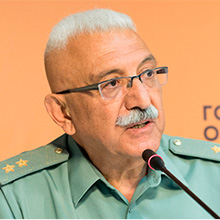 By Hayk KOTANJIAN, Lieutenant General (ret), Professor of RA, RF, USA (strategic security studies), Lazarev Club Board Member By Hayk KOTANJIAN, Lieutenant General (ret), Professor of RA, RF, USA (strategic security studies), Lazarev Club Board Member
On the eve of the 30th anniversary of Ukraine, on August 23, 2021, at the initiative of President of Ukraine Zelensky, the Crimean Platform summit was held with the participation of 46 states and international organizations. The establishment of the platform with the goal of its long-term functioning was announced as one of the main events in the framework of the celebration of the 30th anniversary of independence of Ukraine. According to the President of Ukraine Vladimir Zelensky, the launch of the platform will introduce the problem of "de-occupation of the Crimea" into the international agenda on a regular political and diplomatic basis. READ MORE
After 30 Years of Modern Statehood Armenia Has Little to Celebrate[Over]  By Benyamin POGHOSYAN, PhD, Chairman, Center for Political and Economic Strategic Studies By Benyamin POGHOSYAN, PhD, Chairman, Center for Political and Economic Strategic Studies
Armenia is celebrating the 30th anniversary of its independence but whilst it has all the attributes of a modern state a lot of its institutions are hollow. There is much that can be done, and if it acts reasonably, Armenia can celebrate its 50th anniversary of independence in twenty years’ time in a much more positive atmosphere.
On 21 September 2021, Armenia celebrates the 30th anniversary of its independence. For a nation with at least 3500 years of history, this may not seem a very impressive record. However, since 1045 AD Armenia has never witnessed such a long period of independent statehood in the Armenian highland. Armenia enjoyed a brief period of independence in May 1918 - December 1920, after the collapse of the Russian Empire. However, these two and half years were marked by instability, conflicts, widespread famine, and poverty.READ MORE
Armenia and Turkey Try Again to Normalise Relations. This Time It May Work[Over]  By Benyamin POGHOSYAN, PhD, Chairman, Center for Political and Economic Strategic Studies By Benyamin POGHOSYAN, PhD, Chairman, Center for Political and Economic Strategic Studies
The possible normalisation of Armenia–Turkey relations have always been in the spotlight of the South Caucasus geopolitics. Turkey recognised Armenian independence back in 1991 but refused to establish diplomatic relations, and in April 1993 closed its border with Armenia in response to the advance of Armenian forces in the first Karabakh war. Since then, Turkey has put forward several preconditions for normalising relations with Armenia: the withdrawal of Armenian forces from Karabakh, the end to the Armenian genocide international recognition campaign, and the official recognition of Armenia–Turkey borders by independent Armenia. At the same time, Armenia–Turkey relations were a part of the broader regional geopolitics. Russia struggled to regain its influence in the South Caucasus while the US viewed the emerging Turkey–Georgia–Azerbaijan strategic partnership as a critical tool to counter Russian efforts. READ MORE
- September 22, 2021 23:19PM
The Architecture of an Innovative Strategic Union Russia-Armenia[Over]  Hayk Kotanjian, Lieutenant General (ret), Professor of RA, RF, USA (strategic security studies), Lazarev Club Board Member Hayk Kotanjian, Lieutenant General (ret), Professor of RA, RF, USA (strategic security studies), Lazarev Club Board Member
The strategic emphasis of the 4th session of the Lazarev Club has been imperatively demanded by the need to find and pursue new ways to prevent the loss of the Armenian national statehood. The end-product of those efforts should be built upon the coincidence of the strategic interests of security and sustainable development of our two fraternal peoples and allied states - Russia and Armenia. The existential importance of brainstorming on the problem of life and death of the state, as well as its innovative development, was exacerbated by the challenge of the upcoming formation of new authorities following the results of the early parliamentary elections. READ MORE
- September 4, 2021 06:08AM
Armenian Foreign Policy in the Context of the Transformation of Global Order[Over] 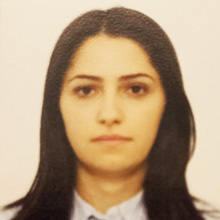 By Lilit Galstyan, Senior Research Fellow, Academy of Political Studies, Yerevan By Lilit Galstyan, Senior Research Fellow, Academy of Political Studies, Yerevan
The end of the Cold War and the collapse of the Soviet Union have ushered in hopes of humanity's happy and harmonious future. The ideas such as "End of history" became very popular both within academic circles and with policymakers. There was a widespread belief that the entire planet would live under liberal democracy, and inter-state conflicts will become bad memories from history. However, the beginning of the XXI century crushed these hopes. Russia - West relations started to deteriorate after the 2004 Orange Revolution in Ukraine, while the 2014 Crimean crisis brought bilateral relations to the lowest point since the end of the Cold War. Meanwhile, the astonishing Chinese economic growth and the emergence of the multi-million middle class did not bring about political changes in China. READ MORE
The Inexorable Drive for Socio-Political Reforms in Uzbekistan[Over]  By Eldor Tulyakov, Executive Director, Development Strategy Center, Tashkent By Eldor Tulyakov, Executive Director, Development Strategy Center, Tashkent
In 2016, Uzbekistan's reform agenda's fresh and rather sudden trajectory focusing on political and socio-economic development brought a welcome surprise to much of the international community. Newly elected President, Shavkat Mirziyoyev, rapidly initiated policies based upon the principles of pragmatism and transparency — a shift well received by foreign governments, international organizations, and citizens alike and viewed as a watershed change in a country largely closed to the outside world since independence was obtained in 1991. A new vision of what will define Uzbekistan for future generations emerged, new horizons that will bring long-sought-after potential and opportunities to its people. READ MORE
Armenia and Azerbaijan Should Restore their United Nations Recognized Borders [Over] 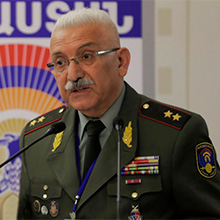 By Lieutenant General (Ret.) Hayk Kotanjian, D.Sc., Full Professor (Strategic Security Studies) By Lieutenant General (Ret.) Hayk Kotanjian, D.Sc., Full Professor (Strategic Security Studies)
The dynamics of the peace and war in the region surrounding Armenia attracts the keen attention of all actors promoting their international security interests in the explosive geostrategic space of the Greater Middle East.
In this context, the resolution of the border dispute in Syunik, and the issue of delimitation and demarcation of the borders between Azerbaijan and Armenia, which is the focus of international attention, requires academic and expert assessment of the legality to consider the current line of contact between the Armed Forces of the Republic of Armenia and the Republic of Azerbaijan as the starting point in the negotiations. The negotiating parties and the OSCE Minsk Group Co-Chair states - the Russian Federation, the United States and France - should take into account the evidence of the following internationally valid arguments. READ MORE
Armenia’s Reformers Struggle On[Over]  By Armen Grigoryan, Vice-president, Yerevan-based Centre for Policy Studies By Armen Grigoryan, Vice-president, Yerevan-based Centre for Policy Studies
After last year’s war, hopes that the 2018 revolution will fulfil its promise are fading – but it’s not too late for change.
“A stellar performance in one year is no guarantee of future success,” declared The Economist after Armenia held free and fair elections three years ago. The qualified praise was not without cause. It was always likely that Armenia’s attempts at democratic consolidation would be difficult, particularly because of the need for some unpopular reforms. Prior to the December 2018 parliamentary elections, observers noted that civic demobilisation – the influx of non-profit sector professionals to the government and their ensuing unwillingness to criticise it – could potentially undermine political pluralism, enable re-emergent authoritarianism, or foster the rise of right-wing populism. READ MORE
Polish-Romanian Defence and Security Policy[Over] 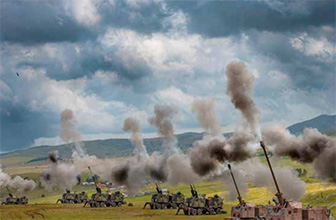 By Eugene Kogan, Tbilisi-based defence and security expert By Eugene Kogan, Tbilisi-based defence and security expert
A joint initiative of Romanian President Klaus Iohannis and Polish President Andrzej Duda, known as the ‘Bucharest Nine', was launched in November 2015 and laid a foundation for foreign and security policy meetings and discussions. As the next step, the Warsaw NATO Summit in July 2016 accelerated military-to-military cooperation. As a result, the initiative brought Romanian troops to Poland and Polish troops to Romania on a rotational basis in March 2017. In addition, their pivotal positions in the east and in the south of NATO’s reach have further increased their cooperation in a variety of defence and security programmes. READ MORE.
Russian-Turkish Relations: Moscow Calls the Tune[Over] 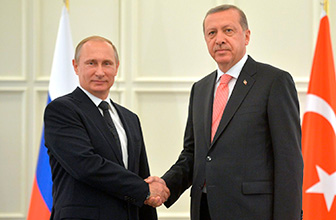 By Eugene Kogan, Tbilisi-based defence and security expert By Eugene Kogan, Tbilisi-based defence and security expert
The relationship between Russia and Turkey is an unequal one. Turkish President Recep Tayyip Erdoğan does not like playing second fiddle in the Russian-Turkish orchestra, conducted by Russian President Vladimir Putin. However, at every twist and turn, Putin holds more leverage over Erdogan than the other way around.
Putin will cooperate with Turkey as long as it suits Russian interests. He would quickly end the relationship if Turkey were to turn against him and tried to return to the Western fold from which it has drifted away ever since the failed coup on 15 July 2016. Erdoğan is aware of this and, as a result, is leading Turkey ever deeper into the Russian fold since the European Union, the United States and NATO all remain suspicious of him and his administration’s goals and are simply unwilling to assist him in his various military activities in Libya, Syria and, most recently, in the South Caucasus. READ MORE.
“All against All” or “All against Nikol”?[Over]  By Benyamin Poghosyan, PhD, Chairman, Center for Political and Economic Strategic Studies By Benyamin Poghosyan, PhD, Chairman, Center for Political and Economic Strategic Studies
Alliances are being formed between Armenian political parties ahead of the 20 June parliamentary elections. Whilst they all claim to want to oust current prime minister Nikol Pashinyan, they are all also busy competing against each other. Despite this, the next Armenian government is likely to be a coalition government.
As Armenia approaches the snap parliamentary elections scheduled for 20 June 2021, the political parties are making final arrangements to form alliances and clarify their positions. The incumbent Prime Minister, Nikol Pashinyan will participate in the elections with his “Civic Contract” party. The second and the third Presidents of Armenia – Robert Kocharyan and Serzh Sargsyan have also clarified their positions. READ MORE
The Realistic Policy of Armenia towards Nagorno-Karabakh[Over]  By Benyamin Poghosyan, PhD, Chairman, Center for Political and Economic Strategic Studies By Benyamin Poghosyan, PhD, Chairman, Center for Political and Economic Strategic Studies
The 2020 Karabakh war has dramatically changed the geopolitical status quo in the South Caucasus. Discussions have been underway in Armenia and the Armenian Diaspora about the reasons for the catastrophe and those responsible. Most probably, military defeat will be a key topic during the upcoming June 2021 snap parliamentary elections. The thorough analyses of what happened before, during, and after the war are mandatory tasks to be fulfilled. However, the key for Armenia now to elaborate a new policy towards the Karabakh conflict, taking into account the war results. The most significant issue here is to develop a realistic policy based on accurate calculations, Armenia’s resources, and the interests of external players; otherwise, Armenia may face another catastrophe. READ MORE
Beijing’s Long Road to the Gulf Region[Over]  By Fuad Shahbazov, Baku-based independent regional security and defence analyst By Fuad Shahbazov, Baku-based independent regional security and defence analyst
Energy cooperation has been a key aspect of growing bilateral cooperation between China and the Arab states of the Gulf region for the past several years. Since 1996, China has become a net importer of crude oil and, as the second‑largest energy consumer in the world after the United States, is now the third‑largest importer of oil after the United States and Japan. Therefore, it should not come as a surprise that China is eying a deep and strategic partnership with the states of a region that sits on top of the world’s largest proven crude oil and natural gas reserves. READ MORE
US-Turkey Relations: CAATSA and Beyond[Over] 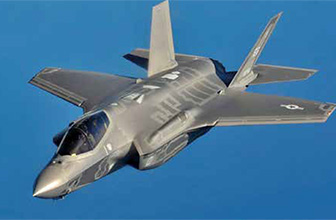 By Eugene Kogan, Tbilisi-based defence and security expert By Eugene Kogan, Tbilisi-based defence and security expert
US-Turkey relations have a history of challenges in general but with the ascent of Prime Minister Recep Tayyip Erdogan in 2001, the challenges reached their peak with the failed coup of 15 July 2016 that Erdogan blamed on the US-based cleric, Fethullah Gulen.
By becoming the first elected executive President of Turkey, Erdoğan has also transformed Turkey from a secular, democratic and reliable Western allied regime guarding NATO’s South-Eastern flank to an Islamic, nationalist and autocratic regime. Erdoğan’s policy is undermining the foundation of US-Turkey relations. This article outlines three cases that highlight the undermining of this relationship: S-400 vs. F-35; Halkbank; the Turkish citizens working at the US Consulate General becoming targets of politically-motivated legal charges. READ MORE.
Searching for the Right Formula for South Caucasus Regional Co-operation[Over]  By Fuad Shahbazov, Baku-based independent regional security and defence analyst By Fuad Shahbazov, Baku-based independent regional security and defence analyst
President Erdogan’s initiative for a 3 + 3 regional co-operation format in the South Caucasus offers the possibility of opening up the region through an extensive network of land corridors. Not everyone has welcomed the initiative, but the prospect of turning a fragile region into a beacon of stability after a long period of instability and violence is a worthy aspiration.
The second Karabakh war has shifted the geopolitical and geo-economic realities in the South Caucasus region, particularly heightening the possibility of competition over the region’s transport corridors. The Moscow-brokered ceasefire agreement signed on 10 November brings with it the possibility of opening a number of transit routes, which have been closed for almost 30 years. In the aftermath of the Armenian forces' devastating defeat in the 44-day war, the idea of regional co-operation becomes increasingly important. READ MORE
Snap Parliamentary Elections are Unlikely to Resolve Armenia’s Political Gridlock[Over]  By Benyamin Poghosyan, PhD, Chairman, Center for Political and Economic Strategic Studies By Benyamin Poghosyan, PhD, Chairman, Center for Political and Economic Strategic Studies
Armenia appears heading for snap parliamentary elections on 20 June, but hopes that the poll may resolve the current gridlock in the Armenian political arena may be premature. For Armenia, things may get worse before they get better.
A tense political crisis has been ongoing in Armenia since immediately after the signing of the 10 November, 2020, trilateral statement on Nagorno Karabakh. That same night, angry protestors stormed the building of the Government and the Parliament, and the National Assembly's Speaker was physically attacked, resulting in him spending a month in the hospital. However, these actions did not lead to the resignation of Prime Minister Nikol Pashinyan. He took refuge in a Ministry of Defence bunker for a week, and there was no organised opposition that could take power while the Prime Minister was absent from the political scene. READ MORE
Why Azerbaijan Is Trying to Rekindle Israeli-Turkish Ties?[Over]  By Fuad Shahbazov, Baku-based independent regional security and defence analyst By Fuad Shahbazov, Baku-based independent regional security and defence analyst
The recent normalisation deals between Israel and the United Arab Emirates (UAE), Bahrain, Morocco, and Sudan signify substantial changes in the Middle East. The new agreements were signed following substantive negotiations on several security-related issues, including Iran and Turkey’s growing influence. However, unlike their Arab counterparts, both Ankara and Tehran denounced the Abraham Accords, labelling them as a betrayal of the Palestinian cause and a “dagger in the back of Muslims. Nevertheless, media reports in December 2020 revealed that Turkey and Israel had established a secret channel for negotiations to prepare a roadmap to further bilateral relations. READ MORE
In US–Iran Relations Compromise Is both Possible and Probable[Over]  By Benyamin Poghosyan, PhD, Chairman, Center for Political and Economic Strategic Studies By Benyamin Poghosyan, PhD, Chairman, Center for Political and Economic Strategic Studies
Iranian hardliners are mostly rational political actors who are not ready to sacrifice Iran's security, and their own power, for the sake of ideological animosity towards the US or Israel. Therefore, even if a hardliner won next June’s presidential election in Iran compromise with the US on the nuclear file would be not only possible, but probable. This would be in the interest of both the US and Iran, as well as the entire Middle East region.
Relations with Iran are among the top priorities for the Biden administration. Since President Trump withdrew the US from the Iran nuclear deal and imposed new sanctions in May 2018, Washington and Tehran have been on a collision course. Iran's decision to start to break some of the deal’s requirements in May 2019, and the assassination of General Qasem Soleimani in January 2020, added fuel to bilateral animosity. READ MORE
|
|